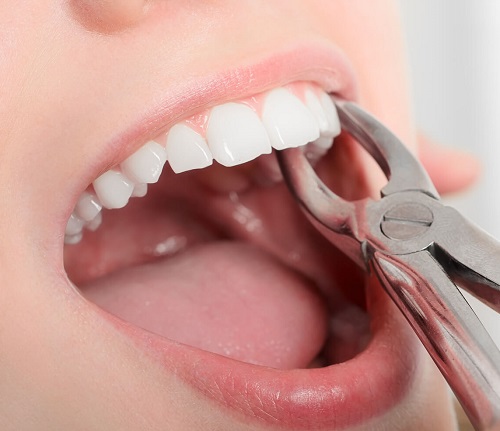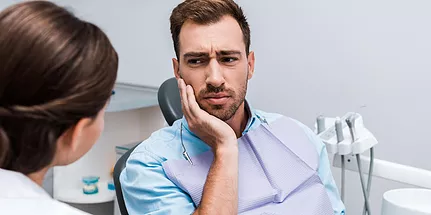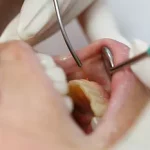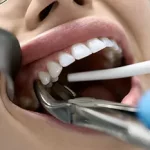Al Barsha(Tel:0443991115, Whatsapp: +971527163131 | International City(Tel:044564090, Whatsapp: +971558579763) | Motor City(Tel:044226041, Whatsapp: 0523287059)
Dental Extraction
Usually permanent teeth after eruption are meant to last for a lifetime but there are some changes that might make us have to extract teeth to get rid of pain or a problem that might get exacerbated.
Dental Extraction
Dentists may resolve issues by extracting teeth as a solution to damage that has happened to the tooth or several teeth that cannot be salvaged anymore. The dentist or surgeon will extract the affected tooth, or teeth when the damage to the tooth extends beyond the layers of the teeth thru the enamel and dentine and reaching the nerve and roots rendering the tooth hopeless and not possible to be treated. Extraction is then done to reduce the pain and prevent any further complications.
Reasons for tooth extraction
There are many different reasons for tooth extractions. Different from person to person, the extent of the damage and the possibility of treatment of the teeth. They are a few common problems that result in the tooth becoming hopeless, necessitating extraction and this becomes the only available treatment to alleviate pain and prevents further problems. These include :
Decay is one of the main problems that results in extraction especially when the decay reaches the inner part of the tooth making it impossible to be treated and requiring extraction.
Gum diseases that result in severe infections that necessitate extraction to alleviate the pain as the whole area of tissue and bone is affected.
broken teeth that cannot be fixed by fillings or crowns and if extraction is not done, it can result in damage in the neighbouring teeth
incase of extra teeth that are preventing normal growth and eruption.
if milk teeth don’t fall at the correct age and the permanent teeth are affected.
incase or crowding and the relief of overcrowded teeth such as in orthodontic treatment. Occasionally teeth need to be removed to create space for the rest of the teeth.
incase of undergoing Radiotherapy or Chemotherapy as these reduce the immunity and so any compromised teeth are removed to prevent any chances of infection.
removal of wisdom teeth incase of impaction or if they are fully erupted but have caused discomfort or in the event of decay. Sometimes it’s recommended to have one or all 4 removed to prevent any future problems.
Procedure before extraction
Before extraction the dentist will check the medical and dental history of the patient to ensure that there no risks due to any chronic conditions or any prescribed medication that might cause any issues. Several steps are to be taken before extraction, they are,
necessary investigations are done prior to prevent any complications before, during or after the treatment .
doing periapical and panoramic radiograph for the jaw and teeth to understand the indications for extraction.
incase any infection exists on the gums then antibiotics should be prescribed prior to treat the infection.
cessation of eating and drinking for about 6 to 8 hours before extraction .
cessation of smoking before and after extraction as it affects the healing .

Types of extraction
Extraction depends on the type of existing problem and the state of the tooth that needs to be removed. Despite the notion that extraction is painful, it’s actually a painless procedure as the dentist will inject an anesthetic at the area of the affected tooth or block the entire area’s sensation in complicated cases.
Surgical extraction
Surgical extraction is done in complicated cases where the tooth is badly broken and it is submerged in the gums and impacted underneath. The dentist will give a nerve block and make a small opening in the gums to remove the tooth. Sometimes removing a little bone is required as part of the treatment or sectioning the tooth into parts to remove in fragments more easily.
Simple extraction
Simple extraction is done when the affected tooth is visible from over the gums. It requires only local anesthetic and then the intended tooth is moved and then loosened using forceps and then pulled out.What after extraction
After extraction whether simple or surgical, there should be a healing period for a few days and the following should be adhered to promote healing and prevent complications.
1. Take the prescribed medication whether it’s painkillers or antibiotics as these help with the pain and the healing.
2. Avoid rinsing and gargling too much or spitting as they will dislodge the clot that has formed and these will delay healing and result in excessive pain
3. Place a gauze to bite at the area of extraction. Place pressure at the extraction site for at least 30 minutes and avoid talking.
4. Stop smoking for at least 3 hours after the procedure. Better to cessate smoking for at least 24 hours to avoid complications.
5. Avoid eating or drinking for 2 hours after the treatment and after that eat only soft food at the side away from the extraction.
6. Avoid any of physical exertion as this might cause pain or bleeding. Also avoid overexposure to sunlight.
7. It is better after surgical extraction to place cold compresses on the cheeks at the side of extraction for about 10 minutes, stopping for 10 and then continuing for another 10 minutes. This will reduce swelling and pain.
If you feel too much pain in your teeth and there’s excessive decay please visit your dentist to diagnose the issue. If one or more teeth have been extracted follow the dentist instructions to avoid complications. If you feel excessive pain, contact the clinic or check with your dentist.
